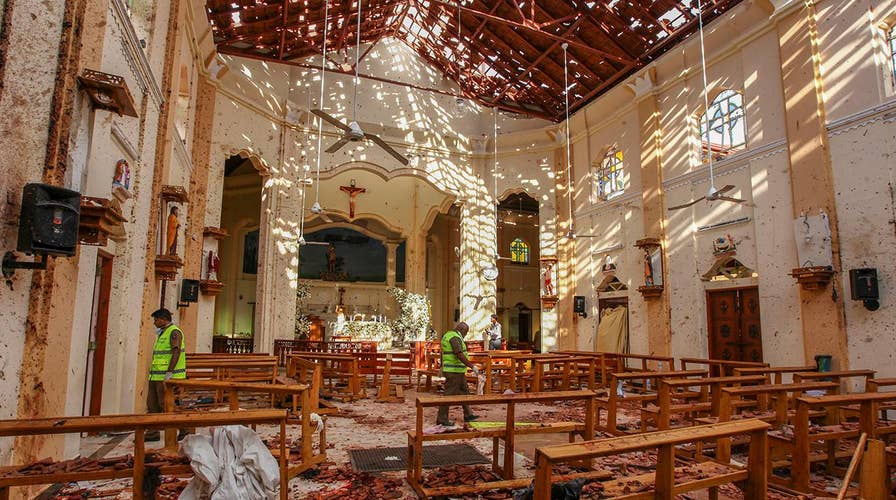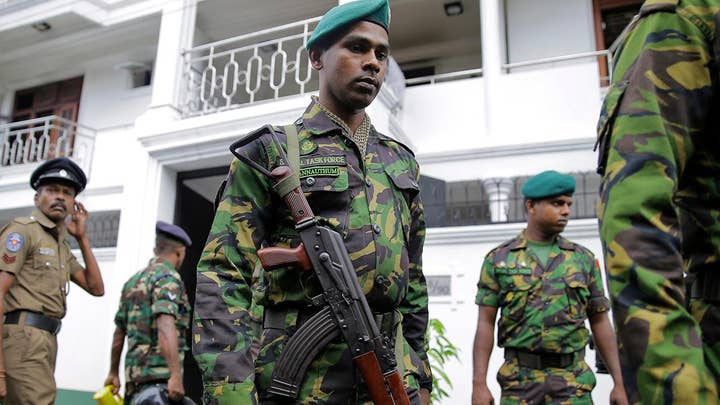Left struggles to acknowledge Islamic terrorists were behind Easter Sunday bombings in Sri Lanka
Too many people play politics with tragedy, says Maajid Nawaz, founder of the London-based think tank Quilliam and author of 'Radical.'
Suicide bombers took over 300 lives and wounded many more in coordinated attacks on Christian churches conducting Easter Sunday services and celebrations at hotels in Sri Lanka. Authorities there are blaming heretofore little-known local Islamist groups. But pulling off such a complex, synchronized operation would almost certainly require greater terrorist expertise and so it is not surprising that ISIS is claiming responsibility.
The carnage among Christians worshiping on that holy day was particularly horrific – and, therefore, impossible for the international press to ignore. Yet, the fact that hundreds of millions of followers of Jesus around the world are being tortured, imprisoned, raped, crucified or murdered all too often goes unreported.
For example, there has been scant coverage of the fact that, according to the Hudson Institute’s Sam Tadros, over the last couple of years, there have been 500 attacks on churches in Egypt and an estimated 900 church attacks Nigeria in one recent five-year period. After fire destroyed much of the Notre Dame cathedral in Paris, greater attention was paid to the immense number of churches in France that have been desecrated or damaged. The French Interior Ministry has reported that there were 1,063 anti-Christian acts in that country in 2018. And an average of two per day were attacked in 2018.
TAMMY BRUCE: 'EASTER WORSHIPERS?' HOW THE LANGUAGE OF THE LEFT AVOIDS REAL DISCUSSION OF TERROR
Worse yet, the trend is in the wrong direction. A leading non-governmental organization committed to helping persecuted Christians, Open Doors USA, assessed last year that there were 215 million Christians facing heavy persecution. In January 2019, the organization estimated that there were now 245 million. In terms of lives devastated, these numbers dwarf previous genocidal atrocities committed by Adolf Hitler, Pol Pot, Josef Stalin and Mao Tse-tung combined.
The difference is that the mass brutalization of Christians globally is happening in our time.
The Easter Sunday massacres call attention to a contributing factor. We now know that at least parts of the government of Sri Lanka were on notice for weeks prior to the attacks that violence against Christians was about to be perpetrated. Yet, nothing was done, even to warn the community that was the intended target, let alone to protect it properly.
It is tempting to attribute such official malfeasance to the acute dysfunction of the Sri Lankan government. But something else almost certainly is at work there, as in so many other countries around the world: a perception that there are no costs associated with the persecution or even the mass murder of Christians.
This attitude is evident not only among terrorist groups like the Islamic State. It applies to many governments as well, like those of China, Iran, Sudan, North Korea, Saudi Arabia, Qatar and India. In such countries, anti-Christian persecution is either practiced as a matter of state policy or, at a minimum, tolerated by their respective regimes.
To its credit, the Trump administration has engaged directly and repeatedly on behalf of persecuted Christians and other religious minorities around the world. But the attacks in Sri Lanka are a powerful reminder that more must be done. Important as it is, rhetorical support and even humanitarian aid to the afflicted is simply insufficient.
We must now undertake to end the sense of impunity that contributes to the behavior of far too many governments that either engage in the persecution of Christians themselves or enable others to do so. As Tucker Carlson urged during his Fox News program on Monday night, the United States government must use the myriad tools at its disposal to hold the persecutors accountable and to impose real costs for their crimes against humanity.
CLICK HERE TO GET THE FOX NEWS APP
For example, President Trump and Congress can serve notice that those responsible for persecution of Christians will imperil the benefits they garner from U.S. foreign aid, military sales, bilateral relations and/or the opportunity for them or their family members to visit this country, be educated here, hold bank accounts in America, etc.
While unlikely to prove a complete panacea to the horror of global anti-Christian persecution, such steps can create powerful disincentives to indifference to, if not outright complicity with, the perpetrators. At the very least, it will send a powerful signal to those suffering and dying for their belief in Jesus that they are not being abandoned by us.


